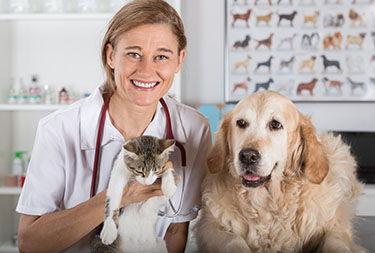A World without Veterinarians?

Have you ever tried to imagine a world without veterinarians?
It’s difficult to picture, isn’t it? While World Veterinary Day is celebrated annually on the last Saturday in April, every single day veterinary and animal care professionals make contributions to improve the quality of care and lives of animals. Here are 25 ways that veterinarians and veterinary professionals have improved the environment and health for both animals and humans.
- Developing vaccinations against common disease. Since Edward Jenner used cowpox to inoculate humans against smallpox in 1796, a close proximity between the development of human and veterinary vaccines has existed.
- Discovering ways to eliminate parasite infestations and reduce risk of vector- borne disease. The World Health Organization reports vector-borne diseases account for more than 17% of all infectious diseases, causing more than 700,000 human deaths annually.
- Combatting zoonotic disease. According to the World Organization for Animal Health (OIE), of the nearly 1,500 diseases recognized in humans, approximately 60% are due to pathogens that can pass from one species to another.
- Continually researching the health effects animals and humans have on each other, and discovering that 75% of emerging human infections originates in animals.
- Working with public health officials to address emerging diseases and coordinating actions between human and animal health professionals.
- Making food safer for humans to eat by preventing the spread of zoonotic disease such as salmonella from animals to humans through tainted food products (meat, milk, eggs).
- Extending the lives and quality of life of beloved companion animals.
- Developing better care, quality of life and nutrition for work animals around the world.
- Helping baby animals to live longer or being able to take over care of a baby animal when a mother rejects her young.
- Researching animal management to prolong lifespan or reduce risk for endangered species.
- Studying the role environment plays on animal and human health.
- Drastically reducing the impact of rabies worldwide, which still kills nearly 60,000 annually, mostly children, with over 95% caused by dog bites.
- Helping to shape public policy on food safety, inspection and environmental impact.
- Serving as a voice for animals by working as forensic veterinarians who treat animals while developing evidence for potential criminal charges of animal abuse, cruelty or neglect.
- Finding new ways to diagnose, treat and prevent animal and human health disorders by working as research veterinarians employed at universities, colleges and governmental agencies.
- Researching methods to combat foreign diseases brought into other countries by working as regulatory medicine veterinarians.
- Studying the effects of pesticides, pollutants and contaminants on animal and human health by working as public health veterinarians.
- Helping to rebuild and improve animal agriculture and care systems in underdeveloped and war-damaged countries.
- Serving in the U.S. Army Veterinary Corps to protect the us against bioterrorism.
- Serving in the U.S. Air Force Biomedical Science Corps to promote public health through surveillance of disease trends, food safety practices and facility sanitation.
- Promoting the important role companion animals play to human society and emotional health.
- Training service and assistance animals to support children and adults with emotional and physical needs.
- Controlling animal populations and their environmental impact with sound management strategies.
- Teaching others how to care for and extend the lives of animals.
- Realizing that every time a vet helps a pet, they also help a human who loves that pet.
Veterinary professionals change the world for the better. They make the world a healthier place both for animals and humans. Veterinary professionals are human. They suffer when animals suffer. If you work in the profession, we thank you for all you do for our animals. And if you are someone who benefits from the work of a veterinary professional, thank your vet today.
Happy World Veterinary Day from all of us at Covetrus. Contact your Covetrus representative for more information at 855.724.3461 or online.
Sources
http://www.who.int/mediacentre/factsheets/fs387/en/
https://healthforanimals.org/our-topics/emerging-diseases-and-zoonoses.html
http://www.oie.int/for-the-media/editorials/detail/article/emerging-and-re-emerging-zoonoses/
http://www.oie.int/infographic/rabies/index.html
https://www.ncbi.nlm.nih.gov/books/NBK22905/
https://globalnews.ca/news/2633165/forensic-veterinarians-battle-pet-abuse-and-neglect/
https://www.avma.org/public/YourVet/Pages/Veterinarians.aspx
Need Regulatory Assistance
If you need help with regulatory or licensing issues, we're happy to help. We have a wide variety of resources to help you when issues arise.

Careers
Are you looking for a place to let your talents shine? At Covetrus, we help our practitioner customers better serve their patients and take pride in providing the best customer experience possible. Search our open positions to see our available opportunities.
Newsletter
Stay current with what’s going on with Covetrus, subscribe to receive our newsletter and email communications. Subscribers will receive the latest information in practice management, sales and marketing, animal health, and more.


Leave a comment